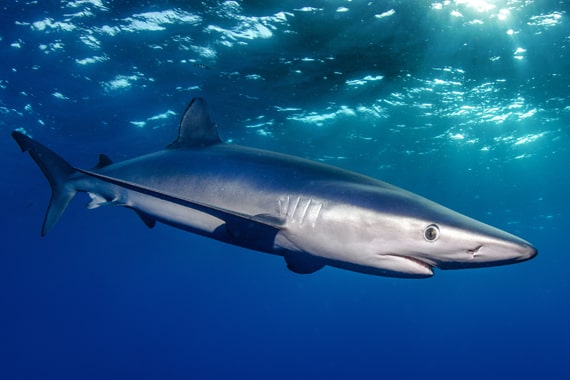
Shark dives take place from Faial island in bottomless blue water well offshore, 1h boat drive away, with blue sharks being the most commonly encountered species, although shortfin mako’s (Isurus oxyrinchus) occasionally show up.
How it works

July to September, although in some years variable due to oceanic conditions; good visibility (+20m) and warmer water (21ºC-23ºC) makes the experience more enjoyable and successful (more than 90% success for blue shark sightings). All trips are dependent on weather and sea conditions.

For scuba divers, +30 logged dives and Advanced Open Water or equivalent certification. This is a dive in the blue with no bottom references and good buoyancy control is fundamental. A check out dive to check diver’s skills is mandatory prior to the trip. Inexperienced scuba divers are encouraged to join this experienced as snorkelers.
For freedivers, only advanced freedivers (AIDA 3, SSI 2 or APNEA ACADEMY 2) can join this activity.

All divers must wear a complete suit, gloves, hood and booties, dark fins, have a whistle or air horn and a SMB.

Sunscreen, towel, wind jacket, sun glasses and a hat; sea sickness pills if necessary.
Is it safe?
All divers are required to sign a Liability Release before leaving the harbour and have valid dive insurance. Our crew is first aid qualified and our shark guides were trained and certified by the prominent shark expert Dr. Erich Ritter and its SharkSchool™.
SHARK DIVING RATES |
|||
|---|---|---|---|
Scuba Diving |
2 Trips |
Snorkeling |
Freediving |
| 200 EUR / person | 360 EUR / person | 180 EUR / person | 200 EUR / person |
| Includes: 1 dive, full tank, weights, drinks and a snack; detailed briefing by experienced and accredited shark guides | |||
| Extras: equipment rental and dive accident insurance | |||
| Important: Although our success rate is greater than 90%, shark sighings are not guaranteed. In case no sharks show up, you will receive a 25% refund. | |||
After decades of over-fishing, encounters with shortfin mako and blue sharks in the wild are becoming rarer. Fortunately, in Azores waters these magnificent animals are still a relatively common sighting.
Dive Azores is committed to fight for shark conservation and for the creation of an Azores Shark Sanctuary. We also collaborate with the University of the Azores with shark research.
Overfishing is currently the biggest threat facing sharks worldwide. Landings have soared over past decades placing huge pressure on shark populations, with serious consequences for marine ecosystems. If we want to protect these sharks in our waters we need to ensure they’re fished sustainably.
In 2019, the Azores Government took the first step towards a shark sanctuary by placing the shortfin mako under full protection and by regulating the bycatch of blue shark and tope. In 2025, Condor bank became a fully protected marine area!
Join us and help us prove the EU and our government that sharks are worth more alive rather than dead! We hope that after participating in our shark diving expeditions and witnessing sharks in their natural habitat, you pass on a renewed desire to help saving these amazing creatures which rule our oceans for 400 million years, survived 5 major extinctions and existed 100 times longer than man!

Sharks are attracted by controlled chumming. Given sharks’ amazing sense of smell, in good days it may take as little as 30 min for animals to show up. Being sharks highly migratory species that travel long distances in a few days, some days can be more challenging, though recent studies suggest blue sharks use fishing banks around Faial island as feeding areas, increasing our chances to encounter them.